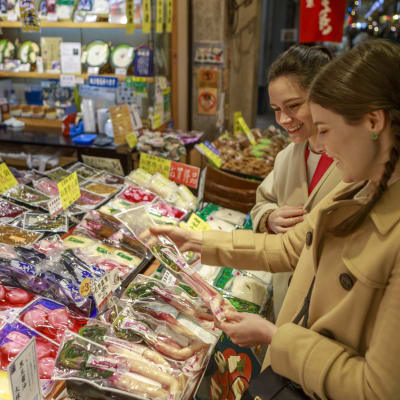-
- 简体中文
- 繁體中文(香港)
- 繁體中文(臺灣)
- India (English)
- Bahasa Indonesia
- 한국어
- ภาษาไทย
- Tiếng Việt
- Singapore (English)
- Philippines (English)
- Malaysia (English)
- Australia/New Zealand (English)
- Français
- Deutsch
- Italiano
- Español
- United Kingdom (English)
- Nordic countries(English)
- Canada (English)
- Canada (Français)
- United States (English)
- Mexico (español)
- Português
- العربية
- Japan(日本語)
- Global (English)
-
Destinations
-
Things to Do
-
Plan Your Trip
-
Articles
- JAPAN Monthly Web Magazine
- Tradition
- Arts & Cultures
- Cuisine
- Nature & Outdoor
- Shopping
- Relaxation
- Festivals & Events
- All
- Insider Blog
- Things to do
- Local Guides
- Outdoor
- Food & drink
- City life
- Culture
- Traditional
- Adventure
- Consumer
- All
Use the
Planning a Trip to Japan?
Share your travel photos with us by hashtagging your images with #visitjapanjp
Kansai
A 5-Day Gourmet Adventure Around Kansai
Co-creation
Photo copyright: © VMG HOTELS & UNIQUE VENUES

This five-day journey through Kansai explores how culinary practices have evolved while remaining rooted in sustainable ways of living. From Kyoto’s long-standing food heritage to the vibrant markets of Osaka and the spiritual meals of Koyasan, the itinerary illustrates the GREEN×EXPO 2027 subtheme of Co-creation—where people and nature have built food cultures together over centuries.
Day 1: Discover Kyoto’s food heritage
Travel by bullet train from Yokohama to Kyoto and start at the Kyoto Food Culture Museum Ajiwaikan. There are exhibits and demonstrations that teach the city’s culinary culture, including seasonal vegetables, preserved foods, and the refined preparation of kaiseki cuisine.

Spend the evening in central Kyoto, and discover local neighborhoods where the traditions of food and hospitality have been carried on for generations.
Day 2: Learn about rural lifestyles in the Kyoto countryside
Take a short drive into the countryside for an overnight stay in a traditional farmhouse. The setting introduces guests to opportunities to learn about rural practices, such as home-style cooking, food preservation, and harvesting local mountain vegetables. These experiences highlight the close relationship between farming families and the natural environment.


Day 3: Food and history in Nara
From Kyoto, travel to Nara, an ancient capital where Buddhist influence shaped both architecture and food. Eat meals made with seasonal ingredients that reflect the city’s historical role in introducing new crops and culinary ideas from abroad.

Stay in the preserved district of Naramachi and allow time to explore its traditional townhouses and narrow streets that have long supported the area’s food culture.
Day 4: Markets and modern city food in Osaka
Head to Osaka, long known as “the kitchen of Japan.” Walk through Kuromon Market and discover the city’s diversity of ingredients and foodstuff, from fresh seafood to local sweets, with stalls supplying both home cooks and professional chefs.

Spend the evening in the city and discover how Osaka’s lively food scene has developed around its trading history and urban energy.
Day 5: Monastic cuisine in Wakayama
Travel about two-and-a-half hours to Koyasan, a mountain temple complex in Wakayama Prefecture. Here, shojin ryori, or Buddhist vegetarian cuisine, emphasizes balance, seasonality, and respect for all life.


A temple stay provides not only a meal but also insight into how food serves spiritual practice and sustainable living.
You May Also Like


©Expo 2027
- Home
- Green Expo 2027
- Model Courses
- A 5-Day Gourmet Adventure Around Kansai
























































